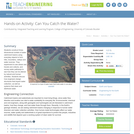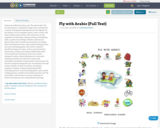
Students construct three-dimensional models of water catchment basins using everyday objects to form hills, mountains, valleys and water sources. They experiment to see where rain travels and collects, and survey water pathways to see how they can be altered by natural and human activities. Students discuss how engineers design structures that impact water collection, as well as systems that clean and distribute water.
- Subject:
- Applied Science
- Engineering
- Hydrology
- Physical Science
- Material Type:
- Activity/Lab
- Provider:
- TeachEngineering
- Provider Set:
- TeachEngineering
- Author:
- Denise W. Carlson
- Janet Yowell
- Jay Shah
- Malinda Schaefer Zarske
- Date Added:
- 10/14/2015

